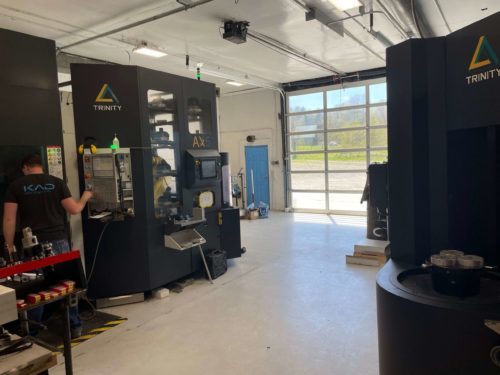Introducing The Future of Manufacturing Series: Solutions for an Evolving Industry
Author: Brian Kippen
Early in my career, I worked for a company with the unofficial motto: We don’t do product problems; we do product solutions.
That phrase struck a chord with me.
I think of KAD as a precision machine shop in the business of providing solutions. When customers submit an RFQ for prototype machining, they’re presenting us with the challenge of bringing their vision to life. It’s my company’s job to find the right solution.
Now imagine applying a solution-oriented mindset to the whole of manufacturing—beyond just one shop and its customers.
Everywhere you look, there are articles, interviews, and essays about problems plaguing our industry. And yet solutions remain few and far between. My team and I want to help tip that scale.
We already approach manufacturing in a unique way. Our passion for engineering transforms prototype machining into an art form. Why not try to change the industry as well?
Introducing: The Future of Manufacturing Blog Series
We want to help solve some of the biggest problems the manufacturing industry faces today.
Through our Future of Manufacturing blog series, I’ll share what our team is doing to understand and respond to pressing issues such as:
- Workforce development and the “skills gap”
- Diversity and inclusivity in manufacturing
- Misconceptions about our industry
- Manufacturing education
- Hiring, retaining, and retiring talent
We have a lot of ground to cover. But we have so much to gain from approaching these issues proactively and working creatively to set new standards.
I’ll give you an example—when I was growing up, working as a machinist wasn’t what you would call “a career path.” The three Ds—dirty, dark, and dangerous—dominated the general public’s perception of the manufacturing industry.
While the industry has evolved to include big, bright workspaces filled with cutting-edge technology and more diverse teams, the negative perception sometimes lingers. But with education and exposure to more people, we have the power to change the narrative and even rebrand the industry.
Recently, an 18-year-old intern in our precision machine shop told us how he describes his job to his friends. He didn’t say, “I’m in manufacturing.” He said, “I get to play with robots all day.”
We can address misconceptions about our industry by getting in front of the up-and-coming generations of workers looking for avenues that might not include a 4-year college degree.
We can invite these individuals into our shops to see what they would be doing, get them excited about job possibilities, and change the perception of precision machining and other manufacturing capabilities, one person at a time.
These are the types of problems and solutions we’ll explore, experiment with, and report on throughout this blog series.
Our Solution-Finding Strategy
I know I don’t have all the answers. There’s a reason this blog post introduces a series instead of summarizing what my team and I have accomplished.
You’re with us on this journey, and we look forward to connecting with other problem solvers and creative thinkers as we tackle these challenges.
Our industry is struggling because we’ve been operating out of an outdated playbook, afraid to change and disrupt the status quo. To be successful in our solution-finding mission, we’re leveraging a strategy anchored in four core values:
Perspective
We need to look through a new lens. Outside views will help us approach the problems from different angles, especially those we haven’t been trained to see. We’ll talk to people outside the manufacturing industry to learn what solutions they’d recommend for manufacturing and how organizations in other fields have overcome similar challenges.
Curiosity
We want to get curious and ask new and nuanced questions about the problems we see in our industry. We’ll ask each other if there are better ways of doing business (i.e., can we leverage technology to make an open job position more accessible or rebrand manufacturing careers, and how?). We seek to interrogate and challenge processes and protocols born out of habit instead of innovation.
Humility
Staying humble throughout this process will be integral to our success. We don’t have all the answers, and we know we might get questions, suggestions, and solutions wrong. We will own our mistakes and practice humility, knowing that we’ll only fail if we stop trying.
Root cause
Everyone in the manufacturing industry can discuss the challenges we face at a surface level, but we want to go deep and get to the root causes. We want to gather foundational information about why our industry operates in the way it does so we can make the proper arguments for change and adjust accordingly. Only when we ask “why” and explore the current crises can we think creatively about solutions. If we can’t articulate why we’re doing something—we should probably stop doing it.
Problems are everywhere. Solutions are harder to find.
The more I think about these issues, the less I feel like I know about them, which makes this series all the more necessary. One company (even a bicoastal one!) can’t fix the industry alone. We’re in this together.
I’m excited to share our discoveries and ideas and welcome your insight along the way. If you’re looking to be part of the solution, we’d love to talk. Drop us a line so we can connect.
__
Brian Kippen is the owner & founder of KAD Models & Prototypes, Inc. Before launching KAD in 2011 with model maker John Dove, Brian worked as the Director of Operations at A&J Product Solutions and a machinist at Performance Structures. Brian is drawn to the challenge of making design concepts into reality and motivated by the ever-changing landscape of machining.



